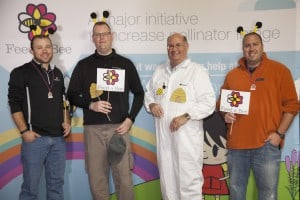Share this article
Fall plantings to bring spring flowers
Over the past several months, Feed a Bee has been buzzing with excitement thanks to the first annual national planting tour. In partnership with The Wildlife Society, its local chapters and other Feed a Bee partners, we are thrilled to have planted 50 million wildflowers to support pollinator health this spring in four special locations across the country – all in the span of just six weeks! Representatives of The Wildlife Society participated in each of our plantings, along with community members, and we’re grateful for their support. Additionally, our two events engaging the communities of Lubbock, Texas, and Flanagan, Illinois, to bring pollinator education to life were great successes.

©Bayer Bee Care
We were fortunate to spend two days in Lubbock, Texas, the first of which was at Texas Tech’s Quaker Avenue Research Farm. Three graduate students in the Department of Plant and Soil Science shared with attendees their research on pollinator forage patterns, plant attractiveness and how irrigation and rainfall affect plant plots. These students are led by Dr. Scott Longing, an assistant professor of entomology and member of The Wildlife Society. Following the presentation, attendees planted native wildflower seed, blended especially for this geographic region with input from The Wildlife Society chapter and local seed vendors, on the farm’s dedicated pollinator plots. Not only will these flowers serve as a food source and as habitat for pollinators, but they will also be a basis for ongoing student research projects sponsored by a USDA Conservation Innovation Grant. The next day, an additional hands-on educational planting took place with children in the Growing Recruits for Urban Business (GRUB) program, part of the South Plains Food Bank. The kids loved hand-scattering seeds and seeing all the equipment that goes into operating a working beehive from a local beekeeper!
In addition to community members attending these events, members of the local media also covered the activities. Journalists from the local FOX, ABC and CBS stations, student magazine The Agriculturist and the Lubbock Avalanche-Journal attended the Lubbock plantings, conducted interviews and helped share the importance of pollinators with people across the area who were unable to attend the plantings themselves.
November brought the planting tour to Salem4youth in Flanagan, Illinois, for an interactive workshop and planting event. Salem4youth, a therapeutic boarding school for young men, has been a long-time partner of Feed a Bee. The school incorporates beekeeping into its curriculum and is an active advocate for pollinator health. Local growers and beekeepers gathered on Salem4youth’s campus and engaged in four breakout sessions, including:
- Bee Education led by Carl Wenning, beekeeper, author and speaker
- Ground Prep, Planting and Maintenance for Pollinator Habitats led by Travis Deppe, agronomy sales associate with Evergreen FS
- Plant Choice led by Jason Fritz, nursery sales manager in the Engineering and Environmental Services Division of Cardno
- Sustainable Agriculture led by Nick Tinsley, SeedGrowth technical representative with Bayer Crop Science division.
Following the breakout sessions, attendees had the opportunity to broadcast native Illinois seed across the school’s new pollinator plot, as well as take home giveaways and raffle prizes. AgriNews, FarmWeekNow.com, Pantagraph and RFD Illinois Radio all shared the work that is being done to promote the health of honey bees and other pollinators.
Designated pollinator patches were also sown with McCarty Family Farms in Scott City, Kansas, and with The Packers of Indian River in Fort Pierce, Florida. All of our Feed a Bee partners in this tour planted additional forage of at least five acres after the events. We can’t wait to see the pretty—and nutritious—flowers in bloom for our pollinators come spring!
Header Image: ©Bayer Bee Care








